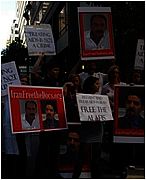Alaei Brothers Deprived From Right to Conditional Release
» Masoud Shafei In Exclusive Interview with Rooz:
The attorney for Alaei brothers, Masoud Shafei, tells Rooz on the second anniversary of their arrest, “The efforts of human rights and physicians rights organizations has not had any effect on the Alaei brothers’ case, and the judiciary chief has opposed overturning their verdicts.” Last week, physicians defending human rights issued a statement calling for the release of Arash and Kamyar Alaei, two physicians that are active in the fight against AIDS in Iran.
Rooz: Mr. Shafei, what are the Alaei brothers charged with, and have they confessed to their charges?
Masoud Shafei (Shafei): The two brothers, according to the indictment, have been charged with acting against national security by cooperating with an enemy state, in this case the United States. The indictment cites Article 508 of the Islamic penal code, according to which any person who cooperates with enemy states against the Islamic Republic shall be sentenced to imprisonment from one to ten years, unless he is convicted of Moharebeh [enmity with God]. The charge of Moharebeh was not relevant to the Alaei brothers’ case, which leaves one to ten year imprisonment for cooperating with an enemy state. We proved that the United States is not an enemy state. We cited precedent from several supreme court cases in which the United States was not considered an enemy state. At that time, only the Iraqi government was considered an enemy state – because of the eight-year war. We argued and finally proved that the United States does not trigger Article 508. Additionally, the Article states that anyone who cooperates with an enemy government against the Islamic Republic will be convicted. The Alaei brothers absolutely did not work with the American government. They worked only with some scientific foundations and institutions.
Rooz: When and how was the trial of the Alaei brothers?
Shafei: Unfortunately, even though it was supposedly behind closed doors, several officers from the intelligence ministry were present at the trial, to which I objected. The judge overruled my objection by introducing them as experts. But even experts are not allowed into closed trials, because experts issue their opinion before the trial. What we saw in the trial was the inability of the judge to manage the trial and prevent the interference of the so-called experts in the proceedings.
Rooz: Have you been able to meet with your clients during the past two years? Are they allowed to use their right to prison vacation?
Shafei: I have to say that fortunately the Alaei brothers are given prison vacation. Both their family members and I are allowed to meet with them. I met with them several days ago. During the meeting they referred to some restrictions in prison, but they weren’t able to openly discuss prison conditions. They silence, of course, is to protect the right to temporary release. We’ve seen that if they object against their detention conditions, even the little rights that they have are taken away from them.


